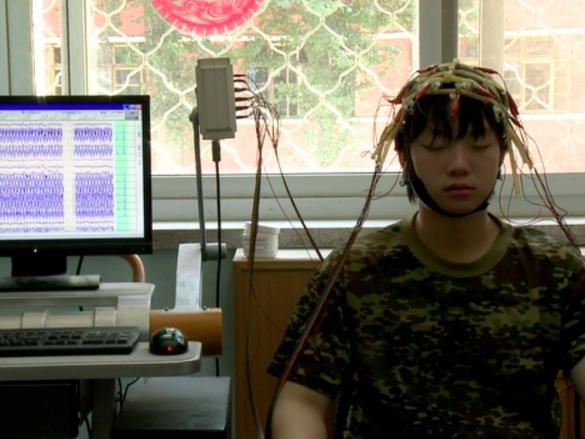Spending all day and night online isn’t indicative of an addiction, is it? In China, that’s certainly the common consensus about such behaviour. The first country to declare abundant internet use a clinical disorder, it now has in excess of 400 institutions dedicated to treating the afflicted. Of chief concern is the predilection for gaming demonstrated by the nation’s teenage populace, with devoting more than six hours a day to online activities other than work or study the threshold where a hobby becomes a problem.
In stepping inside Beijing’s Daxing bootcamp in Web Junkie, no obvious approach is left wanting – the residents talk to the cameras, therapy sessions are captured, experts offer their opinions, and the filmmakers lurk throughout ordinary and explosive moments. A combination of loosely observational, candidly conversational and standard interview documentary techniques are employed by directors Hilla Medalia (Dancing in Jaffa) and Shosh Shlam (Good Garbage) to paint a portrait of attempted deprogramming to solve a very modern problem. The way the feature has been created and compiled mirrors the many methods employed to shake the fanatics from their obsession: the traditional treatment of an unorthodox issue.
As focussed on one boy, 16-year-old Hope, but also illustrated in the others just like him, discontent prevails amongst the camp’s inhabitants. None confess to their computing penchant nor are they pleased with where it has landed them – a position understandable amid the sight of barred windows, unflinching guards and doctors, and uniformed peers. They scream, throw tantrums, brag about their proclivities, and attempt to escape the strict rules and tight security. They complain about being drugged, tricked into going there, and dragged in while sleeping. ‘They should call this the “Teenagers Mental Destroy Centre”’, one remarks.
Offering an unsurprising juxtaposition of youthful and authoritative perceptions, the contrasting opinion primarily comes in the form of parents crying and airing their frustrations, including a mother who describes the internet as ‘an abyss that is swallowing my son’. The facility’s staff further their fears, telling how mental illness is the likely outcome if swift action isn’t taken, and likening playing video games with heroin addiction. Of course, the situation is far from as binary as this delineation suggests, and though the feature endeavours to give time to discussions of isolation and loneliness often intertwined with seemingly disproportionate online usage, it does so only fleetingly. While the film succeeds in showing the shrouded viewpoint of the regime it documents, its superficial leanings are illustrated in its tendency to present the rhetoric rather than probe it.
Of course, the images say much more, incredulous as everything depicted may seem to those watching from a distance. Captured over several months of life inside institutions, they perfect the sense of dread of a place that comes across as part prison, part sci-fi-esque monitoring scheme. Their grim naturalism hammers home the point, every upset altercation and indoctrinated tirade unflinching in its reality. There can be no brightness – visual or otherwise – in a documentary on such a subject, other than the warm glow emitted from the glimpses of computer and television screens, as rare here as for the teens depicted.
Rating: 3 out of 5 stars
Web Junkie
Directors: Hilla Medalia and Shosh Shlam
Israel / USA, 2013, 74 mins
Revelation Perth International Film Festival
www.revelationfilmfest.org
3 – 13 July
Melbourne International Film Festival
www.miff.com.au
31 July – 17 August
Actors:
Director:
Format:
Country:
Release:





